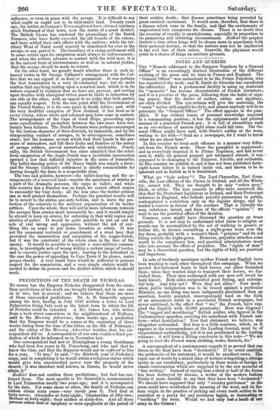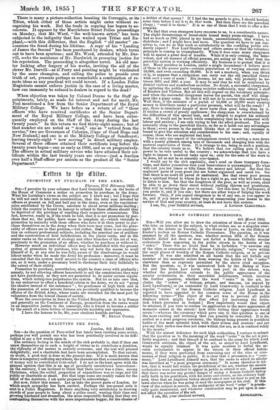NOTES AND Q,ITERTES. THE " Memoir addressed to the Emperor
Napoleon by a General Officer" is an exceedingly distinct illustration' of the different working of the press and its laws in France and England. The " General Officer" was understood to be the Prince Napoleon, who has repudiated the work ; and M. Emile de Girardin has reputhated the editorship. But a professional facility in using up materials for " memoirs " has become characteristic of French literature; and it is a practice of the press, following from the habit.of sign- ing papers, that the duties of author, editor, and siguitary, are often divided. The eye-witness will give the materials, the " crack" writer will supplyt he style, and almost anybody will do to personate the " General Officer." The effect appears in the pam- phlet. It has evident traces of personal knowledge acquired in a commanding position;. it has the epigrammatic and pointed manner of a practised French pen; it is full of absurdities such as an eye-witness of narrow sight alone could fall into. The Ge- neral Officer might have said, with Steele's soldier at the wars, writing to his wife—" Send me a newspaper, for I want to know what we are about here." In this country we treat such offences in a manner very differ- ent from the French mode. There the pamphlet is suppressed; and as everybody imputed it to Prince Napoleon, and had never seen it, while its general purport got whispered abroad, it was -supposed to be damaging to the Emperor, forcible, and authentic. In this country we publish it, and it has not been published forty- eight hours before it is turned inside out, and shown to be as ignorant and as foolish as it is fraudulent. What are "holy orders"? The Lord Chancellor, Earl Gran- ville, the Law-officers of the Crown in Ireland, and all the Minis- try, cannot tell. They are thought to be only "orders grey," black, or white. The nice casuists in office have conceived the idea that the Protestant legislators in Ireland, and their Protestant indorsers in England, who forbade priestly processions in public, contemplated a restriction only on the regular clergy, and in- tended a reserve in favour of the seculars. That is literally the sum, substance, intent, and force of the official " opinion ": we wait to see the practical effect of the decision. Common sense might have discussed the question on truer grounds. It is not easy to understand what harm to religion or morals can be accomplished by the act of walking in goose's or Indian file, in dresses resembling a night-gown worn over the day-dress, probably with a woman's black " peletine" and its red lining outside the night-gown. However, prejudice attaches some worth to the sumptuary law, and practical administrators must take into account the effect of prejudice. The "rights of man" may be a theoretical question, but the rights of follyare practical and imperious. In acts of brotherly assistance neither French nor English have been wanting to each other throughout this campaign. When we needed flat-bottomed boats to land horses, our allies furnished them ; when they wanted ships to transport their horses' we fur- nished them. Their men exchanged with our men soft bread for hard biscuit. Both sides reciprocated good feeling, and substan- tial help. And why not ? Were they not allies ? Now mark : when public indignation was to be roused against a particular Minister, no one thing was more indignantly proclaimed than an assertion, hastily accepted, unscrupulously used on the faith of an anonymous letter in a provincial French newspaper, but never confirmed, to the effect that " we," the French, have sup- plied the English with 10,000 greatcoats! Here was disgrace l The "ragged and mouldering" British soldier, who figured in the Parliamentary speeches, covering his nakedness with French uni- form—what humiliation! Now that statement, we believe, was altogether unfounded. But here is a little sentence, which, as it appears in the correspondence of the Leading Journal, must be of unquestioned authenticity, vet it is not proclaimed in the leading columns : it will form a fitting conclusion to this note—" We are going to lend the French warm clothing, socks, flannels, &e." A correspondent of a contemporary regards it as proved that our forces in the East have been " decimated." If he could establish the arithmetic of his statement, it would be excellent news. The rapid use of words by a mixed class of writers is begetting a strange laxity in our vocabulary, particularly in those words of foreign or classic conformation which are supposed to be the raw material of " fine writing." Instead of saying that a third or half of the forces has been destroyed by disease, a writer of the modern fashion thinks it more forcible to say that they have been " decimated." We should have supposed that only " country gentlemen" on the press could have overlooked the meaning of the word, and its Ro- man origin in the practice of picking out every tenth soldier to be punished as a proxy for any mutinous legion, so decimating or " tenthing" the force. Would we had Only lost a tenth of our army in the Crimea!
There is many a picture-collection boasting its Correggio, or its Titian, which either of those artists might enter without re- cognizing his work. But the trade in copying has begun to ac- celerate. It appears by the Marylebone Street Police proceedings on Monday, that Mr. Ward, "the well-known artist," has been subjected to the indignity that has waited upon Titian and Ra- phael,—with this difference, that the English " old master" en- counters the fraud during his lifetime. A. copy of his " Landing of dunes the Second" has been purchased by dealers, which turns out to have been spurious; and Mr. Ward, attended by Mr. Dar- vill, seeks the assistance of Mr. Hardwick in procuring justice for his reputation. The proceeding is altogether novel. An old mu- ter looking after forgery of his works, inviting the aid of the clever Mr. Darvill—as if Perry and painting might be vindicated by the same champion, and calling the police to preside over truth of art, presents perhaps as remarkable a combination of re- mote ideas as any practical wit could invent. If a London Police Magistrate cannot enforce justice in the case of a living master, how can immunity be refused to dealers in regard to the dead ?
When objection was taken by Colonel Dunne to the Staff ap- pOintments, lately, as made for interest and not for merit, Mr. Peel mentioned a few from the Senior Department of the Royal Military College. We have before us a return of all " those officers who have received certificates at the Senior Depart- ment of the Royal Military College, and have been subse- quently employed on the Staff of the Army during the last twenty years." In this return we find thirty-eight names; • but of that number six are noted as " dead," one as " retired from the service," two are Governors of Colonies, (Cape of Good Hope and New Zealand,) and one is at the Military College of Sandhurst; leaving twenty-eight " now serving" in direct military employ. Several of these officers attained their certificate long before the twenty years began—one as early as 1806, and so on progressively. The officers in actual military service who have attained their cer- tificate within the last twenty years are eleven—just a fraction over half a Staff-officer per annum as the product of the " Senior Department."



























 Previous page
Previous page